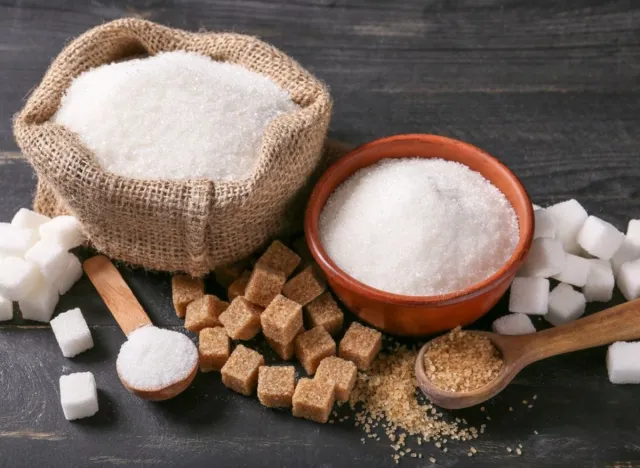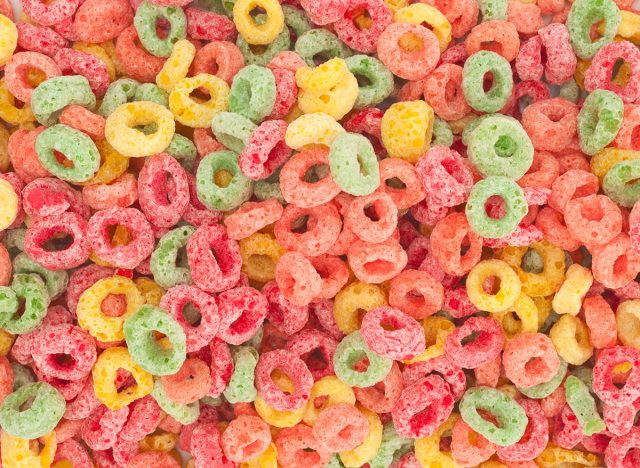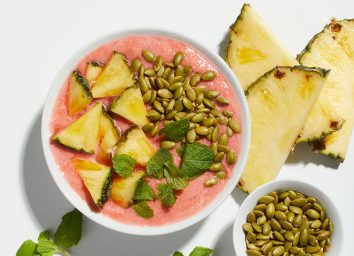If You Meet Any of These 5 Criteria, You Need To Cut Back on Sugar

Sugar is delicious, and eating it in smaller quantities can be fairly harmless. Unfortunately, added sugar is everywhere, and it's hard to not consume it in large quantities on a regular basis.
"Most people in the U.S. eat too much sugar, most of it added, and most people would be better off to lower their sugar intake," says Dana Ellis Hunnes, PhD, MPH, RD senior clinical dietitian at the UCLA Medical Center, assistant professor UCLA Fielding School of Public Health, and author of Recipe For Survival. "By eating a whole, less-processed diet, one can accomplish this goal of eating far less sugar."
And while everyone can benefit from lowering their sugar intake, there are certain types of people that may want to monitor their added sugar intake on a regular basis. Read on to see if you're one of the people who needs to cut back on the sweet stuff, and for more, don't miss 5 Worst Eating Habits for Sugar Cravings, Says Dietitian.
People with diabetes

Those with diabetes may be instructed by their doctors to limit their consumption of added sugar.
"While this is true for both type and type 2 diabetics, those with type 2 diabetes can control their glucose through diet more easily than those with type 1 diabetes. Lowering your sugar intake can help with weight loss, which will simultaneously aid in regulating your blood sugar and reversing your type 2 diagnosis," says Trista Best, MPH, RD, LD, a registered dietitian at Balance One Supplements.
People with high blood pressure

High blood pressure is an extremely common issue affecting Americans, and diet plays a large role in managing blood pressure levels. Because of this, those with high blood pressure may want to monitor how much sugar they're eating on a daily basis.
According to a 2019 study published in Nutrients, people with hypertension (high blood pressure) may be able to lower their blood pressure by lowering their intake of sugar. This study also found that replacing added sugar with natural sugar sources like fruit may help as well.
People with a family history of heart disease

People with a family history of heart disease should also watch their sugar intake. "Consuming sugar-sweetened beverages can contribute to weight gain and is associated with an increased risk of heart disease, stroke, and diabetes," says Janet Coleman, RD, a registered dietitian with The Consumer Mag. "Sugar-sweetened beverages contain calories without providing any nutrients, so they must be replaced with other foods high in nutrients. For example, people can replace the calories from sugar-sweetened beverages by eating more fruits and vegetables or by drinking unsweetened coffee or tea instead of soda pop."
People with depression and/or anxiety

Lowering your sugar intake is not the solution to living with depression or anxiety, but it may help with some of the symptoms. If you're experiencing something like this, you may want to talk to a professional about getting help.
"People with anxiety and/or depression, or those at risk for these conditions should decrease their sugar intake. Eating a lot of added sugars can lead to chronic inflammation. And chronic inflammation is linked to symptoms of depression and anxiety. Focus instead on increasing your intake of fresh fruits and vegetables, lean meats, and whole grains," says registered dietitian Lindsay Delk, RDN.
Most adults and children

At the end of the day, many Americans are eating too much added sugar, so most people in this general population could benefit from lowering their intake.
"Most everyone should lower their sugar intake, and the World Health Organization (WHO) states that adults and children should focus on lowering their sugar intake as much as they can. This is due to the nutritional makeup of sugar-dense foods. They are primarily empty calories providing about 10% of the daily intake of calories while simultaneously not providing a significant source of vitamins or minerals," says Best.









